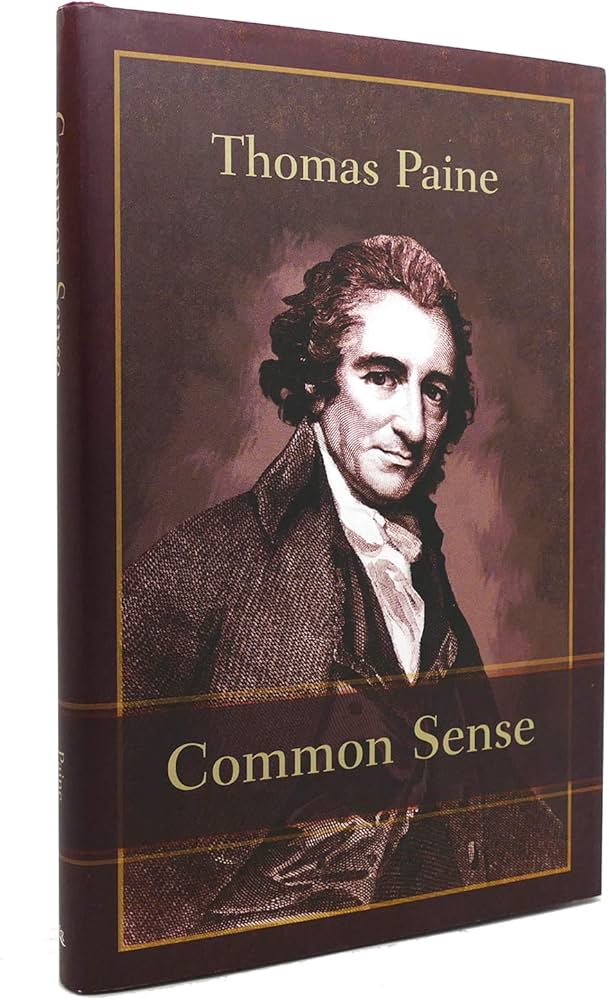Table of Contents
A Revolutionary Philosophy in Plain Prose
Thomas Paine’s Common Sense (1776) is one of the rare works that didn’t just interpret the world—it helped change it. A 47-page pamphlet written in incendiary yet accessible language, it distilled Enlightenment ideas into a rhetorical firebrand that ignited the American Revolution. Paine, writing as a moral philosopher and political realist, bypassed academic niceties to speak directly to the public conscience.
This is not a theoretical treatise in the Kantian or Platonic sense. It is philosophy in action—a pragmatic document of human liberty, written in a style designed to awaken ordinary people to the injustice and absurdity of monarchical rule. Its enduring power lies in its lucidity, moral clarity, and refusal to tolerate passive obedience.
Core Themes: Liberty, Government, and Moral Reason
The Nature and Origin of Government
Paine begins with first principles, distinguishing society (a product of our wants) from government (a necessary evil arising from our wickedness). Government, for Paine, exists not to create virtue, but to restrain vice. This Hobbesian echo is tempered by his Lockean vision: the only legitimate government is one that arises from the consent of the governed.
His prose may be plain, but the idea is radical: authority must be accountable, and monarchy, by nature, is irredeemably illegitimate.
Against Monarchy and Hereditary Rule
Paine launches a full-throated attack on monarchy—not just as a political system, but as an affront to natural equality and reason. Kings, he writes, are “the most ignorant and unfit” to govern simply by birthright. Hereditary succession is likened to a disease passed from generation to generation—the biblical justification for kingship is, to Paine, a theological fraud.
This section embodies Enlightenment rationalism at its sharpest: it seeks not merely to replace a ruler but to disenchant power itself.
America’s Opportunity
Paine argues that the American colonies have outgrown their need for Britain. Distance, divergent interests, and the corruption of British politics make reconciliation impossible. More than strategic, this is a moral claim: freedom is not just practical—it is right.
The text is filled with prophetic urgency: delay will invite ruin, unity will bring strength, and the moment to act is now. For Paine, independence is not a rebellion—it is a restoration of dignity.
The Power of Plain Truth
Paine’s rhetorical style is itself a philosophical argument: truth should be intelligible to all. His rejection of flowery language or scholastic obfuscation is a democratic act. He speaks in axioms and analogies (“a government of our own is our natural right”) and likens British rule to a thief in the night. This is not simplification—it is philosophical clarity in service of action.
Impact and Influence
Common Sense was an instant phenomenon, selling over 100,000 copies in just a few months—a staggering figure in 18th-century America. More than a pamphlet, it was a weaponized idea, unifying disparate colonial voices around a shared principle: that the people, not kings, are sovereign.
Its influence was both political and philosophical. It drew from Enlightenment thinkers like Locke, Rousseau, and Montesquieu, but made their arguments urgent, moral, and implementable. George Washington praised its effect; John Adams feared its radicalism. It pushed the Continental Congress toward independence and changed the tone of the revolution from grievance to philosophical necessity.
Strengths and Limitations
Strengths:
- Philosophy Made Practical: Abstract principles are tied to real-world choices and civic duty.
- Rhetorical Precision: Paine’s argument builds with clarity and force without digression.
- Universal Voice: Avoids elitism and addresses every reader as a moral equal.
Limitations:
- Historical Specificity: Some arguments are context-bound and lose urgency outside the 18th-century political moment.
- Moral Idealism: Paine underestimates the complexity of governance post-revolution.
- Binary Framing: Occasionally lapses into a stark good-vs-evil dualism.
Who Should Read It?
- Political philosophers and students of Enlightenment thought
- Civic educators and constitutional scholars
- Writers and activists seeking rhetorical inspiration
- Anyone exploring the roots of democratic theory and liberal governance
TL;DR
Common Sense is philosophy in its most urgent, public, and actionable form. Thomas Paine proves that ideas can be weapons and that truth—when written with courage and clarity—can overturn empires. His voice remains alive wherever freedom is threatened by power, and wherever plain truth needs to speak louder than entrenched tradition.
If Plato taught us to question the ideal, and Nietzsche to question morality, Paine teaches us to question power itself, and to do so loudly, clearly, and without apology.

Leave a Reply